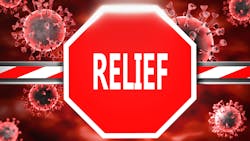Two former federal health officials—Andy Slavitt and Scott Gottlieb, M.D.—are pitching a plan to Congressional leaders that calls for $46.5 billion in the next round of COVID-19 emergency relief funding for improved testing, contact tracing and isolation efforts.
Slavitt, the former head of the Centers for Medicare & Medicaid Services (CMS) under Obama, and Gottlieb, the former FDA commissioner under Trump, are spearheading a bipartisan strategy they believe will allow states to track and isolate infected populations, which will eventually lead to being able to safely reopen the economy.
The letter to Congress was first released to and reported by NPR on April 27. Other healthcare leaders joining Slavitt and Gottlieb in the letter are Farzad Mostashari, M.D., former National for Coordinator for Health IT, Eric Topol, M.D., of Scripps Research, Vivek Murthy, M.D., former U.S. Surgeon General, Atul Gawande, M.D., CEO of Haven, and several others.
The group believes the keys to safely reopening the economy are to test, trace, and self-isolate. Specifically, they wrote, it’s paramount “to be able to provide broad, timely testing for COVID-19; diagnose COVID-19 positive cases; enable infected individuals to self-isolate at home or voluntarily in other facilities (if home is not a safe option or if the individual is unsheltered); trace and alert those who have been exposed to an infected individual; and enable those exposed contacts to voluntarily self-isolate for 14 days after their last exposure to the infected person.”
This approach, they contend, maximizes the chance new infections get contained before they turn into rapidly growing new outbreaks.
Improved testing and capacity “can only be accomplished with the availability of adequate supplies and approvals of new high-speed, high-quality, fast tests by the FDA,” they wrote. As such, they believe Congress must “take swift action in upcoming legislation to give states the funding necessary to scale up our nation’s contact tracing ability and support voluntary self-isolation of infected and exposed individuals.”
Regarding contact tracing and self-isolation, the group wrote that the “existing public health system is currently capable of providing only a fraction of the contact tracing and voluntary self-isolation capacity required to meet the COVID-19 challenge. The country must establish a workforce and support investments to track and contain the spread of the virus, which in turn, would have the added benefit of acting as an economic stimulus and creator of new jobs.”
The group’s funding plan falls under four categories:
- Expansion of the contact tracing workforce: Here, they call for $12 billion in funding, a number they came up with by estimating the contact tracing workload per case and multiplying that by the number of daily cases. To this end, they estimate the necessary contract tracing workforce needs to be expanded by 180,000 until a safe and effective vaccine is on the market. They noted that contact tracing efforts in Massachusetts demonstrate that lay people can quickly be hired and trained, with 15,000 applications submitted for 1,000 positions within two weeks.
- Voluntary self-isolation facilities utilizing vacant hotels: The leaders believe that individuals need to be offered the opportunity to self-isolate for up to two weeks if they are unable to do so in their homes. They point to “substantial evidence that providing a voluntary option to safely isolate will help to dramatically reduce spread of infection to one’s family and therefore the spread of infection overall.” They estimate that 14 percent of infected individuals and exposed contacts will need such an option, and point out that hotels are largely sitting idle at present and can provide local options for such voluntary self-isolation sites. The total funding is estimated for this initiative is $4.5 billion.
- Income support for voluntary self-isolation: This is by far the biggest funding bucket. The group wrote that we must offer “income support to individuals for whom loss of income during 14 days of voluntary self-isolation represents a prohibitive barrier to being able to self-isolate.” This support, which they estimate will require approximately $30 billion in funding over the course of 18 months, will be needed for some 40 percent of individuals who will get a $50 stipend per day.
- Primary care provider referrals: The group contends that primary care physicians should be a referral source for testing and contact tracing. “While additional dollars don’t need to be allocated from Congress at this time, Congress should take steps to ensure the health of primary care practices and Medicare should establish a referral payment code for referring patients who test positive for Coronavirus to the proper contact tracing resources,” they said.
In total, the $46.5 billion in estimated funding will be “required to successfully contain the virus spread,” the health leaders attested. “We propose Congress authorize and appropriate this funding in the form of block grants to states and territories twice annually based on plans they submit to the Department of Health & Human Services with their projected case counts, testing capabilities, and as they are available, data tools for functions such as immunization tracking. All unspent funds returned to the federal Treasury at the time a vaccine is widely available and the virus contained.” They added that states should also have the ability to use up to 10 percent of the funding for expenses directly supporting the success of this effort, such as training, public communications, and food delivery.


